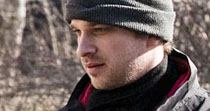Interview with Lars-Gunnar Lotz, director
What is the topic of your film and your approach to it?
In the beginning there was only an idea, to do something on social workers. To begin with, that sounds quite boring. But many of my friends work in social sector and their stories always sounded exciting to me. I think their work hardly finds attention in films. Besides, I've been involved in voluntary youth work for many years myself.
My author Anna Maria Praßler and I took the time to find a special and gripping approach. By chance we found the Seehaus Leonberg, an institution where inmates could serve their sentence outside prison walls and which is unique of its kind. Here, young offenders often experience family life for the first time, by living together with the social workers and their families. During my research, my respect grew for these young men who took part in this strict program and embraced this second chance to start a new life. The staff also impressed me, their commitment often goes beyond the professional involvement.
We used this as a starting point to construct the story of juvenile offender Ben, who surprisingly meets his victim Eva in form of his social worker. Ben finds himself against his will and with this also what we call a conscience.
It was my mission not to tell of hopeless cases and violent "animals", as they're often branded. I wanted to show what it means when you stand by them and confront them with their crimes. I wanted to tell a story that doesn't give these boys up, but believes in them.
I also found it interesting, to tell of a character such as Eva's, who becomes a victim to those she wanted to work with, and therefore starts to question her ideals. Through this situation she is forced to deal with her own issues.
Does the Waldhaus in the film work in the same way the institution does in reality?
For the most part, yes. Seehaus Leonberg has many more rules and weekly events. Everything is more complex. But we needed to focus of course, on meaningful rituals like giving pointers in the group and the hot chair.
Isn't it very dangerous to live together with convicts?
Of course, this is certainly a question you ask yourself! In Seehaus Leonberg nothing has happened so far. The boys are treated with respect, which they offer in return. They don't just come there, but must apply and show good will to change. And as soon as there is even a hint of violence, back they go to prison. And nobody wants to go there again. And they are aware of their unique chance.
How should they be treated, in your opinion?
Recidivism is very high in juvenile delinquents. So you have to think about alternatives. Young people often fall deeper into crime when they land in prison. This is why I advocate more sentences to be carried out outside of prison. Of course you need many sponsors, political support and a lot of volunteer staff. In the end, chances are higher that young people find back to a normal life because much more is required of them and encouraged.
How was working with the actors?
This was my first feature film and I was very happy to work with the casting director Karen Wendland. This job is easily overlooked. The casting of Ben was not easy. There is a lot of young talent around, but we were looking for someone who believably had the toughness of a violent criminal as well as the inner torment and development to an empathetic boy. With Edin Hasanovic we were definitely lucky because he had such a powerful presence and at the same time played in a very tender and graceful way. Julia Brendler was my first choice for Eva, because she gave the social worker such a wonderful warmth and depth. Working with both, but also with the rest of the ensemble was delightful.
